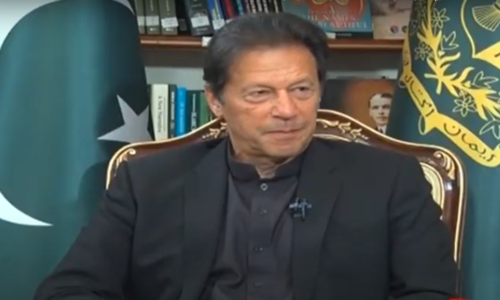Information Minister Fawad Chaudhry has denied the impression that the PTI-led government's policymaking is heavily influenced by the security establishment, saying Prime Minister Imran Khan and his cabinet are firmly in charge.
Appearing on the BBC's noted programme HARDtalk, Chaudhry also defended the freedom of expression and press under the current government and played down reports regarding an increase in violence against independent journalists in the country.
Host Stephen Sackur asked Chaudhry to comment on his government's independence, saying: "Farzana Sheikh, a respected analyst at Chatham House says 'What’s different about this (PTI) government is the dropping of all pretence that it conducts policy independent of the military. Previous governments sparred with the top brass, but Imran Khan seems happy to do just as he’s told.' That's the perception your government has inside and outside."
Responding to the claim, the information minister said "this may be a perception of some Indian-influenced think-tanks … it's not the perception here in Pakistan and it's not the perception among independent people."
"I would say Imran Khan is one of the most popular prime ministers of Pakistan. [He] has received more than 200 million votes, he makes the decisions, the cabinet makes the decisions. And yes, we have a very very good relationship with the so-called establishment; they are part and parcel of Pakistan’s system, we have huge respect for them but the decision-making rests with the prime minister and the cabinet," he added.
When grilled about incidents of violence against journalists and the attack on Asad Ali Toor earlier this week, Chaudhry said Pakistan was "probably one of the freest states as far as media is concerned".
Regarding the assault on Toor, he said: "Yes there has been an incident. I took notice of that incident last night, I sent senior police officers to investigate the case. We've found CCTV footages of the people who were involved in this case and people will be apprehended."
But Chaudhry argued that it was "fashionable" for the Western media to accuse the ISI every time such an incident took place. "I know there has been a history of people using and taking names of intelligence agencies to get immigration also," he claimed.
"Individual incidents do happen and such incidents happen everywhere in the world and Pakistan is no exception," he added.
The minister claimed that the number of attacks on journalists had actually reduced since Prime Minister Imran took over. "And when you name any Pakistani organisation or intelligence agency, you are bound to produce evidence of that also," he said.
Sackur then questioned Chaudhry about BBC Urdu having to cancel its programme on AAJ TV following alleged state interference from Pakistani authorities.
"Had we thought as aggressively as you just mentioned about the BBC, we would not have allowed the airing of BBC World, which is one of the most-watched international channels in the country and we've never obstructed its transmission by any means," the minister replied.
He said when it comes to Urdu TV channels, media organisations "have to abide by certain local laws".
Sackur countered: "Isn’t it true that when it comes to issues like attacks on journalists or censorship, you as information minister have no real power? There are other elements in the Pakistani state, some call them the 'deep state', that have powers far superior than yours."
Chaudhry denied such an impression, saying he was the information minister of "the world’s fifth-largest state and one of the seven nuclear-armed states of the world. No one can dare undermine me … I am here with full authority and I decide in Pakistan what will happen."
Earlier this week, journalist and YouTuber Asad Ali Toor was severely beaten up by unidentified assailants outside his residence in Islamabad's Sector F-10 late on Tuesday night.
Following the incident, Chaudhry took notice of the attack and ordered the Islamabad police chief to probe the matter.
The journalist was accused of defaming the military last year and also faced a court case in this regard. According to the FIR, Toor had allegedly indulged in propaganda against Pakistan and its institutions on social media for a long time.
However, the Lahore High Court absolved him of the charges after the FIA police told the court that no evidence was found to support the charges.
Earlier this month, a report released on the occasion of World Press Freedom Day suggested that not only is violence common against Pakistani journalists but that violent incidents happen more commonly in the federal capital than other areas.
The report launched by the Freedom Network said that Islamabad, with 34 per cent of all violent attacks in the country, comes out as its most dangerous and riskiest region for journalists.
'Least number of missing persons in PTI govt'
When questioned about enforced disappearances and the alleged involvement of security agencies, Chaudhry said the Inter-Services Intelligence (ISI) and the Pakistan Army respected human rights "just as much as any civilian government. they are one of the most civilised armies of the world and they are the most responsible army of the world."
He said most of the persons reported missing "had actually voluntarily gone into Afghanistan, into troubled areas, and when they went missing, you use agencies and the state for that".
"Let me tell you, the least number of missing persons are reported under Imran Khan's government. We are the only government who have just passed a law against disappearance, we have made illegal confinement a criminal offence and now the bill has been passed by the cabinet and it will go to the parliament. This is one leap forward in the cases of enforced disappearances."
Answering a question about Pakistan's slow vaccination drive, Chaudhry quoted the UN General Assembly president as saying that Pakistan had been a good example and its pandemic-related policies were better than many countries.
"We have vaccinated 5.5 million people. Frankly, as far as Covid is concerned, Pakistan is a great success story," the minister said.














































